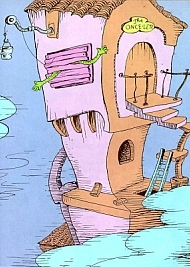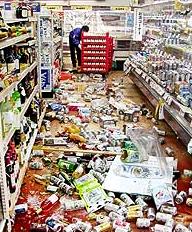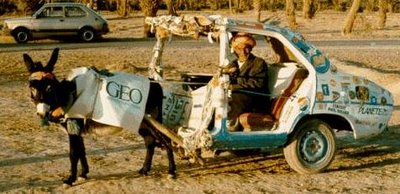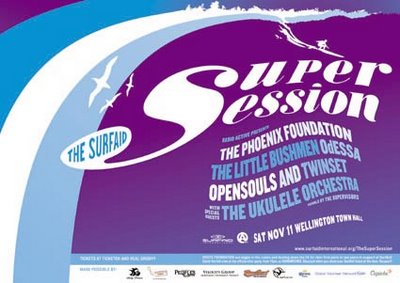GREENING OF THE KEY (2.0)
Update: National party leader John Key - our Once-ler of today's earlier post - spoke again this morning. This time in Queenstown. On the environmental policy front Key advocated looking to Australia and their investigations into the viability of a carbon market. The Greens have been hasty in dissing Keys intentions - saying that the Oz system will not incorporate a cap on emissions to compliment the trading activities proposed.
On the environmental policy front Key advocated looking to Australia and their investigations into the viability of a carbon market. The Greens have been hasty in dissing Keys intentions - saying that the Oz system will not incorporate a cap on emissions to compliment the trading activities proposed.
Yes, Oz and the US have resisted placing a cap on emissions, but to say that this situation will continue is misleading at best. We all know that for a particular resource market to function there needs to be relative scarcity of that resource. Australia knows this of course, and so will formulators of any carbon trading market. An emissions cap will be implemented.
Ah yes, the cat fight continues.
Wednesday, November 29, 2006
GREENING OF THE KEY
Wellingtons "Greening of the Quays" project is designed to lift the appearance of a dull concrete barrier between a wonderful waterfront and thousands of CBD shoppers and office workers. Will the greening of John Key and New Zealand's National Party lift the appearance of their dull policy barrier? Will it bring the environmental quality of our wonderful planet to the explicit attention of the hundreds of thousands of National voters?
Will the greening of John Key and New Zealand's National Party lift the appearance of their dull policy barrier? Will it bring the environmental quality of our wonderful planet to the explicit attention of the hundreds of thousands of National voters?
Yesterday Key outlined some of his "core principles" to drive his leadership - including the following statement:
"It is a mystery to me why the political Left acts as if it has a monopoly on environmental policies, when it is obvious to anyone who cares to look that all of us, across the political spectrum, with the exception perhaps of the Greens, have taken too long to put the protection of our environment at the forefront of our thinking. That needs to change. In the National Party we have taken steps to do this, and we will be taking more steps."
"[P]rotection of our environment at the forefront of our thinking" - something I'm looking forward to seeing clear indication of. Just how will the much vaunted Blue-Green vision for New Zealand play out. Especially as National will most likely steer our good ship following the 2008 general election.
Two similarities spring immediately to mind. First, to David Cameron the British Conservative Party Leader who lurched greenward after winning party leadership late last year. Second, and this would apply to both Key and Cameron, similarities to The Once-ler in the iconic Dr Seuss story The Lorax are abound.
The Once-ler had become a recluse (unlike Key) having pillaged the landscape in order to make his fortune. At the end of the story The Once-ler offers the very last truffula tree seed.
"Plant a new truffula. Treat it with care.Was yesterdays speech to party faithful the peace offering of the Once-ler? Is his audience able to embrace the seed and "treat it with care", or has all the "figgering on biggering" consigned the political right to eternal myopic inertia?
Give it clean water. And feed it fresh air.
Grow a forest. Protect it from axes that hack.
Then the Lorax
and all of his friends
may come back."
More about: climate change, ecology, New Zealand, politics
Posted by
mikeymike
at
9:43 am
0
comments
![]()
Friday, November 24, 2006
PRICE IS RIGHT! Electricity generators - the "big boys" of New Zealand industrial emitters - today told the Government "there is a general consensus [that] a price needs to be put on carbon." No kidding!
Electricity generators - the "big boys" of New Zealand industrial emitters - today told the Government "there is a general consensus [that] a price needs to be put on carbon." No kidding!
Carbon capture and storage, agricultural emissions, and transport emissions were also talking points.
This development is strong indication that emissions trading is more than just "a possibility" for Kiwi business.
It may be close - the big boys may soon shed their sumo suits.
More about: business, climate change, energy, New Zealand
Posted by
mikeymike
at
11:55 am
0
comments
![]()
Thursday, November 23, 2006
THE 'IN' CROWD
Understanding consumer attitudes is key to illuminating the business case for addressing environmental impact. This is the only "sustainable" means of engaging your average business in change. In developing the ShoppingFix concept I've done a fair bit of nerd-work on consumer behaviour. Recently our Trust has been doing some work for the Sustainability Trust - looking at the Wellie hospitality sector. A few key stats and studies have been handy.
In developing the ShoppingFix concept I've done a fair bit of nerd-work on consumer behaviour. Recently our Trust has been doing some work for the Sustainability Trust - looking at the Wellie hospitality sector. A few key stats and studies have been handy.
Comparison of attitudes to those in other countries is exceptionally important. Especially as New Zealand is a long way behind when it comes to addressing consumer impact. And of course when we say consumer impact we are implying business impact.
A picture of the extent of "lag" is evident in three studies:
One: Nick Jones & Associates conducted NZ research concluding late 2005. They found that 58% of people aged 10+ "think more highly of companies that support charities/worthy causes". This isn't overly surprising, but what it does emphasise is that companies should communicate their efforts to their customers.
Two: Moxie Design were funded by the Shell Sustainability Fund to conduct NZ ethical marketing research earlier in 2005. Their Solution Seekers report (155kb pdf) shows that 26% of New Zealand consumers "purchase in accordance with their social and environmental values".
Three: The UK Carbon Trust concluded British research last month that found 66% of consumers want businesses to act on climate change, and that "environmental concerns influence about about 50% of buying decisions".
Clearly the way the question is posed is important (for some research in this field click the Compass Network link at right). But for me, and for Kiwi businesses, there are two key points:
* Kiwi consumers haven't put their words into action yet (58% v 26%).
* Taking the UK as a sighter, there is massive growth looming in the New Zealand "ethical consumer" market (26% v 50%).
Granted, the 26% figure was arrived at prior to An Inconvenient Truth and the Stern Review, so it will be higher today. But the UK research was also conducted pre Stern Review.
The basic facts are clear. More and more people are looking at how they consume. The "in crowd" is getting bigger.
More about: business, New Zealand, research, sustainable shopping
Posted by
mikeymike
at
10:05 am
0
comments
![]()
Tuesday, November 21, 2006
CARBON CASH OUT IN THE COLD
But maybe not for long. Good old Queenie has final say in the UK legislative process. Last week she outlined a bill to be put to the British parliament committing to a massive reduction in human induced GHG emissions. What riled many was that an annual emissions target was not included. This speaks from the same policy chapter as the possibility of each Briton being issued with a carbon allowance. DTQ's and TEQ's have spawned from this concept - whereby Britons would "spend" their allowance depending on the carbon loading of the things they buy. It's classical polluter pays economics and not too dissimilar from the basis for establishment of the EU Emissions Trading Scheme and the Chicago Climate Exchange.
What riled many was that an annual emissions target was not included. This speaks from the same policy chapter as the possibility of each Briton being issued with a carbon allowance. DTQ's and TEQ's have spawned from this concept - whereby Britons would "spend" their allowance depending on the carbon loading of the things they buy. It's classical polluter pays economics and not too dissimilar from the basis for establishment of the EU Emissions Trading Scheme and the Chicago Climate Exchange.
The British, as part of the EU ETS, are streets ahead of where Kiwi businesses are. Although the odd doubt exists over the effectiveness of ETS, large British (and EU) organisations have been mandatorily accounting for their emissions for some time. As the system is refined the scope to replicate the concept at the individual level emerges.
We Kiwis have a range of carbon calculators available to us - CarbonZero is now easier on the eye, the NIWA version is a little simpler, while the MfE calculator is a little abstract. Many airlines offer customers the option of offsetting individual flights (BA have partnered with ClimateCare for theirs), and the Kaikoura Trees for Travellers scheme offers a practical local solution for the climate impact of the local economy's cornerstone activity.
Over the weekend another initiative was publicised. Celsias is a new business program that will also allow individuals and households to calculate and improve their profile on order to earn tradeable carbon credits. This is a departure from existing means of calculation as it will directly reward those who improve their emissions performance.
But much relies on Government policy. We've been sitting in a vacuum for a while now.
When our Government gets their shit sorted, carbon trading will offer opportunity a plenty for New Zealand businesses (and individuals). We've the advantage of having operated in a deregulated market for 20 years now. Our products more than most reflect the cost of production with accuracy. The elephant in the room - the un-accounted for cost to the environment - is surely a cost that we're ready to recognise. What are we afraid of?
Next week there's an opportunity to get the local low-down on carbon pricing options. The government and environment people at VUW bring you a lunchtime seminar next Friday 1st Dec. 12.30-1.45pm, room 312, level 3, at the railway station.
More about: climate change, New Zealand
Posted by
mikeymike
at
1:24 pm
1 comments
![]()
Saturday, November 18, 2006
SATURDAY SENSITIVITY - OF THE HEAD
Here's the second piece in our Saturday Sensitivity series. With summer being as it is, you could be driven to feeling like The Dude (mind the language - small ears may be affected).
I came across a site put up by a Cal.State University undergrad for the purpose of sharing her research on "Bowling, Gender and Emasculation in The Big Lebowski". It's quite clever (if not a little titchy) - and sheds a whole new light on what is possibly the finest modern Hollywood movie ever made.
"As the myth of manhood continues to be deconstructed, men may also be able to release the steady grip on their testicles that they have held for centuries, thereby allowing healthy circulation to the weak phallus of male identity, mapping out a new male territory where they can be both confident and erect."
More about: comedy, film, Saturday Sensitivity
Posted by
mikeymike
at
1:02 pm
0
comments
![]()
Wednesday, November 15, 2006
REVOLTING
Brits have had enough. You probably have too. Some say that sustainability starts at home. In reality it often starts at the supermarket. Or rather it gets left at the supermarket. A British Government minister yesterday called for a public revolt against "excessive and unnecessary" food packaging.
A British Government minister yesterday called for a public revolt against "excessive and unnecessary" food packaging.
A friend highlighted a local example in a photo essay that's hanging on a wall somewhere in Wellington. I hate naming and shaming, but Sealord Tuna packs are a pathetic waste of resources.
In fact Britain's local environment minister is to spank the big boys (of supermarkets) for not addressing waste issues. Do you hear our David Parker backing up the Packaging Accord?
Of course not, because "producers and packaging users will take more responsibility from the beginning to the end of the packaging lifecycle". There. Done. Perfect. The blessing of a voluntary, industry led Kiwi initiative.
Name and shame, and a sarkie 'tude in the same post isn't flash, but with any luck the Waste Minimisation Bill will come to the rescue. In the meantime maybe on your next shop you can ditch the debris.
More about: recycling, sustainable shopping, waste
Posted by
mikeymike
at
9:58 pm
0
comments
![]()
Monday, November 13, 2006
PEDAL TO THE MEDAL (2.0) Honda Civic Hybrid took overall honours in the AA EECA EnergyWise rally that finished on Friday. A small victory in a "hybrid battle" that saw the Toyota Prius win the last EnergyWise rally.
Honda Civic Hybrid took overall honours in the AA EECA EnergyWise rally that finished on Friday. A small victory in a "hybrid battle" that saw the Toyota Prius win the last EnergyWise rally.
In true love/hate fashion, the large car categories were dominated by Hyundai with Volkswagon achieving an honourable mention. It's in these big tin things that many Kiwi's explore the outdoors.
The Herald reported last week that recreational trips are a key contributor to New Zealands transport emissions. So again, if you must go large, Hyundai is the best motoring option.
More about: energy efficiency, New Zealand, transport
Posted by
mikeymike
at
11:13 am
0
comments
![]()
Monday, November 06, 2006
THE SESSION GOES SUPER
No, not the brilliant Thursday night show on Active. The SuperSession. Coming to you this Saturday night at the Wellington Town Hall. Wellies finest muso's and an equally fine bunch from up north are getting together to raise money for the work SurfAid International in Indonesia. What a lineup! The Phoenix Foundation, The Little Bushman, Twinset, Open Souls, OdESSA, and the Wellington International Ukulele Orchestra.
Wellies finest muso's and an equally fine bunch from up north are getting together to raise money for the work SurfAid International in Indonesia. What a lineup! The Phoenix Foundation, The Little Bushman, Twinset, Open Souls, OdESSA, and the Wellington International Ukulele Orchestra.
An unbeatable lineup and a fantastic cause. Tickets at Ticketek and Real Groovy.
More about: aid, community, events, music, Wellington
Posted by
mikeymike
at
12:40 pm
0
comments
![]()


